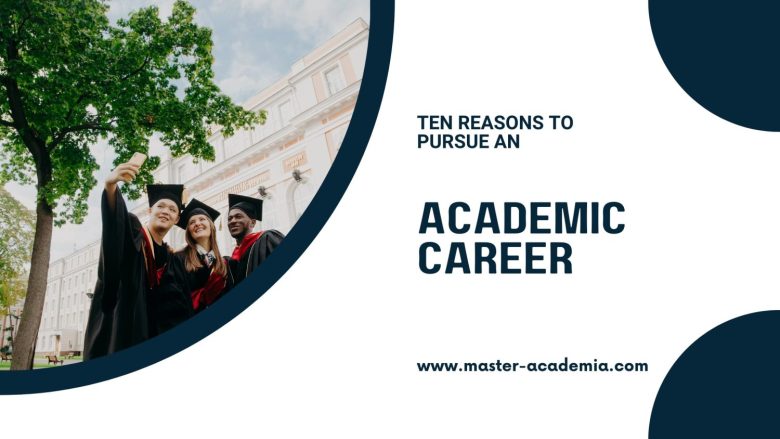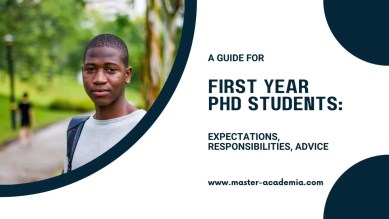
There are many benefits to pursuing an academic career. Ultimately, the decision to do a PhD, and to work in academia, is a personal one. It should reflect your personality type, work preferences, and goals. However, the following ten reasons highlight the key advantages of academic careers.
Contents
- 1. You turn your passion into work. (And get paid for it.)
- 2. You have a high degree of self-responsibility.
- 3. You are in charge of your own time.
- 4. Your tasks are varied.
- 5. You earn a good salary. (Or you have good salary prospects.)
- 6. You can have a real impact.
- 7. You can be critical.
- 8. You are travelling frequently.
- 9. You have a high social standing.
- 10. Changing your focus can even benefit your career.
1. You turn your passion into work. (And get paid for it.)
Most academic careers start with an intense fascination or interest in something. It can be a social phenomenon, a chemical reaction, or a passion for, let’s say, birds or musical theatre. Nowadays, you can find PhD positions in all thinkable niches.
Wouldn’t it be great if you could spend the majority of your working life following your interests?
Learning more about the topics that fascinate you? Teaching others about it?
As this article in the Journal of Happiness Studies (yes, no kidding…) shows, passion is a crucial factor in academic success.
2. You have a high degree of self-responsibility.
Academia is no place for people without self-discipline. But if you prefer to make your own decisions, and to take matters into your own hands, it might be the right place for you.
As an academic, you are the driver of your success.
Of course, academics are often involved in certain projects and educational programs, providing a framework for some of their activities.
Yet, a high degree of self-responsibility is characteristic of most academic careers.
You may also like: Ten reasons NOT to pursue an academic career
3. You are in charge of your own time.
A career in academia is no standard nine-to-five job. As a fulltime PhD student, you might have regular supervision meetings. You might also have teaching responsibilities.
What happens in the remainder of your 40-hour work week is entirely up to you.
More senior scholars have more appointments and busy agendas. Nonetheless, a high degree of flexibility tends to remain.
Rough night? It’s okay to sleep in. Dentist appointment? No need to take time off. Leaving early Friday afternoon for a weekend getaway? No problem.
4. Your tasks are varied.
The job description of an academic is quite diverse. The image of the white-bearded old man sitting in a library reading all day (i.e. the portrayal of a ‘scholar’ in popular culture) is far from reality.
Academic careers aren’t monotonous. Trust me, you won’t get bored.
Academic tasks can range from lecturing, proposal writing, editing, and administration, to participating in conferences, organizing community outreach, conducting fieldwork, and disseminating research findings (on social media).
And yes, thinking, reading and writing.
5. You earn a good salary. (Or you have good salary prospects.)
Academics, on average, earn good salaries. Details can differ by country, as can be seen for instance here, but all of the earnings are decent.
Furthermore, in many countries, academic salaries are predetermined and equalized. This means no awkward salary negotiations, a level playing field and the ability to plan.
It is no secret that many early career scholars and PhDs face financial challenges. But once you secure good funding or a position, the compensation is usually fair and generous. This is true for both permanent and temporary contracts.
6. You can have a real impact.
Academics have the reputation of being passive and detached from reality. You know, the famous ivory tower metaphor… This is far from true.
As an academic, you are concerned with theory. But you can have a real impact in the real world, too.
The opportunities for real impact are vast.
Many academics are activists, supporting for example marginal groups. Others advocate for legislative changes or develop vaccines. Others work closely with policymakers or businesses.
7. You can be critical.
Academics are not only allowed to be critical. Often, they are encouraged to be critical.
This can involve other scholars’ work to improve science. Or public, private and non-profit sectors looking for academic expertise.
A wide range of organizations and individuals are looking for honest and unfiltered feedback.
Critical evaluations are sought after, and academics are valued for speaking out. Other professionals have to be careful with what to say and deal with petty office politics.
8. You are travelling frequently.
Even though Corona put a temporary halt on it, (international) travel remains a key component of academic life.
Most academics visit at least two or three conferences per year, and travel costs are generally reimbursed. Great opportunity to extend trips for a few days!
In addition, academics are often part of international networks. Or they work as part of international research projects. Face-to-face meetings are still being valued. Therefore, regular travelling is a normal part of academic jobs.
9. You have a high social standing.
We have all heard about the value of intrinsic motivation. But let’s face it. It makes us feel good when others admire our work.
While it should not be the main reason for pursuing an academic career, there is also nothing wrong with enjoying it from time to time.
Academic careers have a high social standing.
Your answer to the typical “What do you do?” question at dinner parties is usually met with admiration and respect. Despite a 99.5% chance that the one who asked the question will never understand what you do.
10. Changing your focus can even benefit your career.
Pursuing an academic career can be a lifelong journey. Your path is not set in stone.
Most academics start by specializing. This topic then either evolves throughout the years or changes completely.
Contrary to other professions, academic careers don’t force you to remain within certain boundaries.
Jumping from one topic in anthropology to one in mathematics is of course more tricky than shifting from psychology to economics. But trying out new topics, and linking new disciplines, is not only possible. It may enhance your career.



